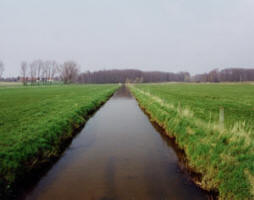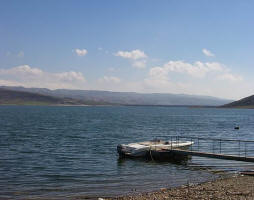 Responding to Drought – WMO-GWP Integrated Drought Management Program Launched
Responding to Drought – WMO-GWP Integrated Drought Management Program Launched
The World Meteorological Organization (WMO) and Global Water Partnership (GWP) have launched a joint Integrated Drought Management Programme (IDMP) on March 13, 2013, to improve monitoring and prevention of one of the world’s greatest natural hazards.
The programme was launched at the High-level Meeting on National Drought Policy (HMNDP) in Geneva, Switzerland, where decision-makers and scientists from around the world are discussing proactive, forward-looking national drought policies to replace the current piecemeal, reactive approach.
“Whether because of climate variability or climate change, droughts have a severe impact on water availability and quality, agricultural and energy production, and ecosystem health,” says GWP Executive Secretary Dr Ania Grobicki. “There is an urgent need to develop better drought monitoring and risk management systems, and for countries to have frameworks in place to manage drought risks through an integrated approach. This programme aims to support countries in this endeavor, within their regional contexts.”
“Without coordinated national drought policies, nations will continue to respond to drought in a reactive way. What we need are monitoring and early warning systems to deliver timely information to decision makers, effective impact assessment procedures, pro-active risk management measures, preparedness plans to increase coping capacities, and effective emergency response programmes to reduce the impacts of droughts. The Integrated Drought Management Programme is therefore an important initiative,” said WMO Secretary-General Michel Jarraud.
The new programme capitalizes on the ten years of success with the Associated Programme on Flood Management, a joint project of WMO, the Global Water Partnership, Japan, Switzerland and many other partners. It will focus especially on sharing scientific information, knowledge and best practices to advise policies and management approaches.
The growing concern worldwide is that droughts are increasing in frequency and severity, due to climate change. This was discussed at the Geneva meeting where a GWP delegation from several regions and the Global Secretariat is participating. “The increase in catastrophic events such as droughts and floods will impact lives, livelihoods, land values, and investment incentives, especially in vulnerable areas inhabited by poorer populations,” according to Alex Simalabwi, GWP global climate change focal point.
Sabina Bokal, the project manager for the new GWP Central and Eastern Europe drought programme located in Bratislava, Slovakia, said, “In co-operation with national hydro-meteorological institutions, river basin authorities, ministries, research institutions and the Southern and Eastern Europe Drought Monitoring Centre (DMC), the project will implement drought monitoring and risk assessments.”
At global level, the IDMP will contribute to best practices related to drought risk management through:
- · Better scientific understanding of, and inputs for, drought management;
- · Improved knowledge base, with better access to information and products;
- · Drought risk assessment, monitoring, prediction, and early warning;
- · Policy and planning for drought preparedness and mitigation across sectors; and
- · Drought risk reduction and response.
Better drought management is also one of the priorities of the Global Framework for Climate Services, the GFCS. This framework is now being implemented by governments with support from several partners from the United Nations System. Climate services can be a powerful tool to increase drought resilience, by improving climate information and services, especially for the most vulnerable. They will build on fast improving climate prediction capabilities.
GWP is responding to the climate change challenge through a portfolio of programmes and projects aimed at building climate resilience through better water management. Initial implementation of the regional drought programmes will focus on Central and Eastern Europe, the Sahel (GWP West Africa) and the Horn of Africa (through GWP Eastern Africa). These regional programmes will contribute to the global integrated drought management programme located within WMO´s Water and Climate Department.
More about the meeting and the new programme: http://www.gwp.org/gwp-in-action/Events/GWP-at-High-Level-Meeting-on-National-Drought-Policy/
--
Read also:
United Nations launches concerted push for effective drought policies: Need to focus on building resilience and reducing risks
Droughts cause the deaths and displacement of more people than cyclones, floods and earthquakes combined, making them the world’s most destructive natural hazard. Yet while droughts are expected to increase in frequency, area and intensity due to climate change, effective drought management policies are missing in most parts of the world. Three United Nations institutions have now joined forces to promote the development and adoption of practical and proactive policies at the national level to make drought-prone countries more resilient.
The World Meteorological Organization (WMO), the Food and Agricultural Organization of the United Nations (FAO) and the UN Convention to Combat Desertification (UNCCD) and other partners will hold a High-Level Meeting on National Drought Policy on 11-15 March 2013 in Geneva to focus on drought preparedness and management policies.
“Since time immemorial, drought has been a feature of the natural variability of our climate,” said WMO Secretary-General Michel Jarraud. “The frequency, intensity, and duration of droughts are expected to rise in several parts of the world as a result of climate change, with an increasing human and economic toll. We simply cannot afford to continue in a piecemeal, crisis-driven mode. We have the knowledge and experience to reduce the impact of drought. What we need now is the policy framework and action on the ground.”
“Despite being predictable, drought is the most costly and the deadliest disaster of our time. The decision to mitigate drought is ultimately political. Governments of all drought-prone countries need to adopt, mainstream and operationalize national drought policies, based on the principles of early warning, preparedness and risk management,” said UNCCD Executive Secretary Luc Gnacadja.
“The cost of crisis management far exceeds that of risk management and early action and we should not wait until the next drought, causing famine and claiming human lives.” “More extreme and frequent droughts resulting from climate change are having devastating food security impacts, especially in the most vulnerable regions of the world,” said FAO Director-General José Graziano da Silva. “To buck this trend, we must build resilient, ‘drought-resistant’ communities.
This means not simply reacting after the rains fail, but investing over the long-term, so that when drought does hit, people and food systems can weather the blow.” The High-Level Meeting on National Drought Policy brings together world leaders, government decision-makers, development agencies, and leading scientists and researchers. Government leaders include His Excellency Issoufou Mahamadou, President of the Republic of Niger, whose country has been repeatedly hit by devastating droughts, most recently in 2011-2012.
The conference is open to the media. Full details of the programme are available at: http://www.hmndp.org/
Further information on EMWIS website
CGIAR Highlights Tools that Improve Farming Responses to Drought
In the context of the upcoming High-Level Meeting on National Drought Policy to be held in Geneva, Switzerland, from 11-15 March 2013, the Consultative Group on International Agricultural Research (CGIAR) is highlighting a collection of tools and outputs of its research centers that are contributing to more effective responses to drought.
CGIAR describes the work carried out by the International Center for Agricultural Research in the Dry Areas (ICARDA) in developing the "Focused Identification of Germplasm Strategy" to allow plant breeders to identify traits such as drought tolerance and resistance to high temperatures by matching ecological data with data on plant traits.
Other approaches highlighted include: work of the Research Program on Climate Change, Agriculture and Food Security (CCAFS) on how satellite data can improve crop yield forecasting; the efforts of the International Rice Research Institute (IRRI) to map communities that are prone to drought in India; and the research carried out by the International Water Management Institute (IWMI) on how below ground water storage can alleviate floods and droughts.
CGIAR also describes insurance schemes for farmers as an effective risk management strategy for drought-prone areas in Africa and India.
Further information on EMWIS website
| Contact information |
Global Water Partnership (GWP) Drottninggatan 33 SE-111 51 Stockholm, SWEDEN
(email: gwp@gwp.org ) Phone: +46 8 121 386 00 Fax: +46 8 121 386 04 |
|---|---|
| News type | Inbrief |
| File link |
http://www.gwp.org/gwp-in-action/Events/GWP-at-High-Level-Meeting-on-National-Drought-Policy/ |
| Source of information | Global Water Partnership (GWP) |
| Keyword(s) | drought management plan |
| Subject(s) | AGRICULTURE , FINANCE-ECONOMY , HYDRAULICS - HYDROLOGY , INFORMATION - COMPUTER SCIENCES , METHTODOLOGY - STATISTICS - DECISION AID , NATURAL MEDIUM , POLICY-WATER POLICY AND WATER MANAGEMENT , PREVENTION AND NUISANCES POLLUTION , RISKS AND CLIMATOLOGY , TOOL TERMS , WATER DEMAND |
| Relation | http://www.emwis.net/topics/WaterScarcity |
| Geographical coverage | Switzerland, |
| News date | 18/03/2013 |
| Working language(s) | ENGLISH |
 you are not logged in
you are not logged in





